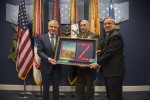 It’s like pushing a heavy block across sandpaper.” That’s what DoD Comptroller Bob Hale said yesterday in the Pentagon’s Hall of Heroes at a ceremony celebrating a significant milestone– the USMC’s clean audit opinion on the current year Statement of Budgetary Resources. For those in the federal financial world, that is BIG news! In typical USMC “Out in Front” style, the Corps took on the task of being the first Service to declare audit readiness and complete the process to prove they are ready. It was an effort like no other seen in DoD financial management. I’m hoping that over the next two years there will be three more ceremonies celebrating audit completion of the remaining Services. The DoD IG is skeptical given the wording in their recent report to Congress for good reason. These audits are complex, large and little understood by most in the DoD. The USMC audit involved hundreds, if not thousands, of Marines, civilians and auditors from Grant Thornton LLP (GT) (lead by audit partner Tracy Greene) and its subcontractors and involved combing through terabytes of data and tons of paperwork around the globe! One can imagine how much more complex it will be to audit the Army, Navy and Air Force.
It’s like pushing a heavy block across sandpaper.” That’s what DoD Comptroller Bob Hale said yesterday in the Pentagon’s Hall of Heroes at a ceremony celebrating a significant milestone– the USMC’s clean audit opinion on the current year Statement of Budgetary Resources. For those in the federal financial world, that is BIG news! In typical USMC “Out in Front” style, the Corps took on the task of being the first Service to declare audit readiness and complete the process to prove they are ready. It was an effort like no other seen in DoD financial management. I’m hoping that over the next two years there will be three more ceremonies celebrating audit completion of the remaining Services. The DoD IG is skeptical given the wording in their recent report to Congress for good reason. These audits are complex, large and little understood by most in the DoD. The USMC audit involved hundreds, if not thousands, of Marines, civilians and auditors from Grant Thornton LLP (GT) (lead by audit partner Tracy Greene) and its subcontractors and involved combing through terabytes of data and tons of paperwork around the globe! One can imagine how much more complex it will be to audit the Army, Navy and Air Force.
So what can the Services learn from the USMC accomplishment? As the Partner at GT responsible for the DoD account when this journey began I have a few observations from a non-CPA:
- All senior leaders need to be united in their support of the audit and not just those in financial management. In other words, this has to be a priority for the Service Secretary, the Service chief and every commander in the field. Most of the transactions take place in individual commands, far removed from the Pentagon. They have far more impact on a successful audit that those in the Pentagon.
- Don’t let the audit become a bill payer. Given that there’s well over a trillion dollars involved, the costs of an audit are immaterial.
- Fix problems as they arise. Don’t play “Stump the Monkey” and protect rice bowls. Make it a cooperative effort.
- Have a dedicated team devoted to accomplishing the audit (a Task Force AUDIT) whose sole purpose is audit. You can’t be successful by dumping yet another task on an already stressed workforce.
- Don’t rely on IT systems. In the end, most problems are people-related.
When I was in uniform I thought audits were just “science projects for the green eyeshades.” After all, the Congress continued giving us money and rarely questioned our accounting. If we told Congress we spent $800 for a toilet seat, they believed us! No one ever said, “Surely there was just a bookkeeping error.” They believed us. But I was wrong then because I have come to realize that audits are not about making sure the credits and debits balance. They are about ensuring the DoD can manage its money, not by figuring out how much money they have after the fiscal year is over, but knowing how much they have today and every day. DoD is so unsure about balances that it maintains huge cushions of cash in many accounts just to make sure they do not violate the Anti Deficiency Act. Imagine not looking at your checkbook for six months and writing checks anyway because you know you have put way more money in your account than you could ever spend. That’s basically what happens. But the budget environment has changed and money is getting tight. That cushion is not likely to be around for long. In order to still accomplish their missions, the Services must have an accurate accounting of their money day-by-day. Audits allow the services to have confidence in their accounting procedures and thereby allow them the ability to efficiently obligate and track money.
Let’s stop planning and start doing the Service audits and in doing so become even better stewards of the nation’s treasure.

